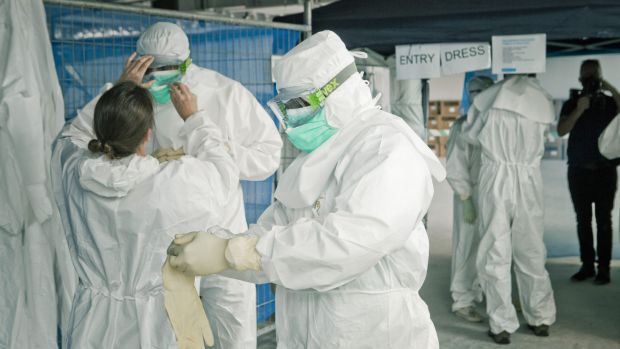
Healthcare workers complete predeployment training in Canberra to prepare them for working in West Africa as part of Australia’s response to the Ebola crisis. Photo: Supplied
For Australian health workers travelling to West Africa to help fight the Ebola crisis, it almost impossible to fully prepare them for the stark reality of what awaits them on the frontline.
A fourth deployment is expected to depart Australia for Ebola-stricken West Africa in coming weeks and are due to begin preliminary training in Canberra this month.
“We try to rotate tasks so people don’t do the same task again and again because that’s where complacency or fatigue might kick in, so the rostering we do with staff and how we manage people is quite important.”
Aspen Medical executive director Glenn Keys
More than 30 Australians have travelled to Sierra Leone to work in the Australian-run Ebola Treatment Centre.

Healthcare workers complete predeployment training in Canberra to prepare them for working in West Africa as part of Australia’s response to the Ebola crisis. Photo: Supplied
It is understood none of the Australians working in West Africa has contracted Ebola.
New images of the training undertaken by Australians have now been released as another contingent prepares to depart to assist with the crisis which has claimed the lives of more than 7500 people.
Canberra-based Aspen Medical was awarded a six-month multimillion-dollar contract by the Abbott government to run a treatment centre in Sierra Leone.

Jane Armstrong, Aspen Medical Clinical Training Manager, Dr John Gerrard and Dr John Parker taking part in predeployment Ebola training in Canberra. Photo: supplied
Health workers undertake preliminary training in Canberra, including familiarising them with the working environment, security, the use of personal protective equipment, red and green zones, and scenario testing on what to do if infected people turn up at the clinic.
Aspen Medical executive director Glenn Keys said the training also dealt with personal matters such as wills, vaccinations and power of attorney.
In Sierra Leone, workers complete intensive in-country training, working in “wet zones” and being paired with experienced clinicians, and learning about treatment, before working in the Australian-run clinic.
The Australian workers generally did a four-week rotation in the Aspen-run treatment centre.
“Their work could be actually managing patients on the floor, it could be auditing processes to check that people are conducting the right style of activity. It’s a range of different activities but it’s all absolutely fundamentally involved with running that ETC and caring for people who have Ebola,” Mr Keys said.
“We try to rotate tasks so people don’t do the same task again and again because that’s where complacency or fatigue might kick in, so the rostering we do with staff and how we manage people is quite important. We also do a lot of coordination with the other aid agencies that are delivering services because we want to learn from them.”
Mr Keys said the Ebola crisis could be tackled through an international and coordinated effort only.
“We’re now talking almost 20,000 people (infected) and thousands dead so this is a level of contagion in regard to Ebola that the world has never seen before,” Mr Keys said.
“I think the path we’re on at the moment where we’ve got lots of clinics, lots of education, and lots of outreach work being done is really critical.”
Mr Keys said it would be impossible to predict when the Ebola outbreak might be brought under control.
“I think everybody is being very cautious and appropriately so, and I think those cautions are producing benefits,” he said.
“We’ve seen quite a marked drop off in isolated Ebola cases in places like Europe and America and I think a lot of that is due to the sort of mechanisms we’ve got in place.
“No-one can predict the future but I’d like to think that certainly the mechanisms that are in place seem to be restricting the spread of the disease out of north west Africa at the moment.”
Mr Key said Aspen Medical was delivering according to agreed timeframes and the AMA was happy with training provided by the company.
“I think the most important thing is to know that the people who are delivering care are safe and that patients are receiving treatment.”
Mr Keys has announced he is taking a 12-month sabbatical to focus on philanthropic activities but said he would remain involved in the Aspen Medical board.
